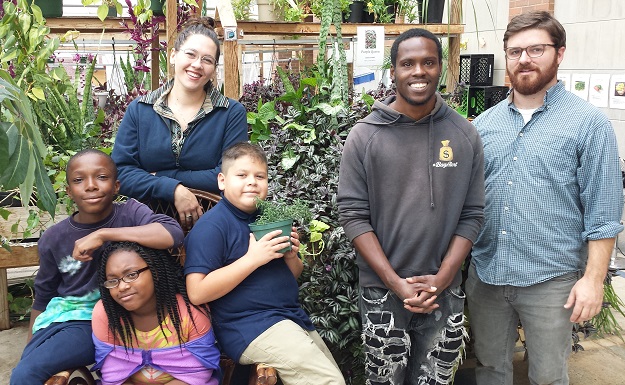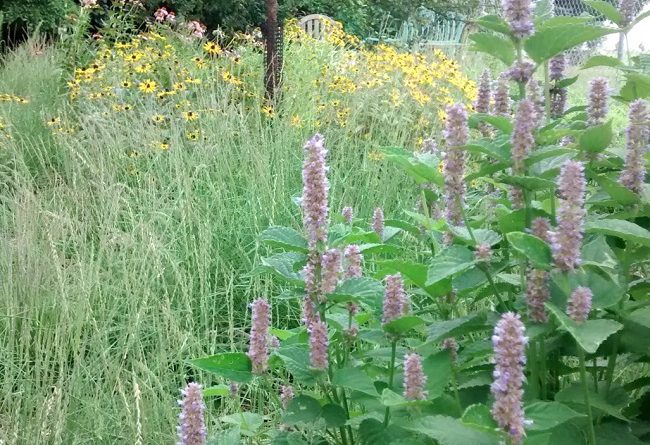October 8, 2017 – Start the Garden Revolution
Let’s cut to the chase. In the words author Benjamin Vogt,
We live in a world of perfectly spaced plants that mimic headstones aligned in exact intervals. Wood mulch is more important to us than flowers. We clean up our gardens like they are living rooms after the children have gone to bed. We mow the world back on roadsides, hellstrips, business frontages, vacant lots and parklands, beating any sense of wonder, awe, or love into submission.
But lest you think that Vogt’s new book, A New Garden Ethic: Cultivating Defiant Compassion for an Uncertain Future, is simply a diatribe against 21st Century horticultural business as usual, he also writes
Gardens are one primary way to connect to the world, to lift the veil of our emotions, fears, and desires while holding a dialogue withe environment and species whose language we have lost over time. Each garden places us firmly within the context of all life, awakens us to the web, humbles us as we become aware of ourselves as a node in that interlinked web. When we touch the soil, we touch our ancestors and our children, we know the heartbeats of worms, birds, insects, and mammals with each scrape of the nail and each cut of the skin.
As the title of the book suggests, Vogt is issuing a call to action, a call to rethink our gardens in the face of ever-increasing species extinction. Some people call is the Sixth Mass Extinction, and it’s not a coincidence that it is occurring in what is sometimes called the Anthropocene Epoch. Vogt rightly calls this accelerating disappearance of plant and animal life genocide. Given his background as owner of Monarch Gardens LLC, a company that designs native plant prairie gardens, it’s not surprising that he focuses on the necessity to incorporate more natives into our gardens. You should know why, but just to hammer it home,
Grasslands used to cover one-third of the world, but tallgrass in America is now fragmented along with its wildlife, comprising only 1 to 2 percent of its original area. Since 2009, we’ve plowed up prairie the size of Kansas, 53 million acres, a rate faster than Amazon deforestation over the same time frame. That’s also 3.2 billion metric tons of carbon released, equal to the exhaust emitted by 670 million cars.
He takes issue with the “all of the above” strategy of plant selection–the notion that it doesn’t matter whether a plant is a native or not, as long as the plant communities live in some sort of aesthetic “harmony.” In fact, he questions the very concept of aesthetics as a criterion for garden creation, noting that it is arrogant to impose human culture on nature:
Democracy is not giving all plants a fair shot in the garden. Democracy is respecting the revived ecosystem, the place of native plants and wild relationships, their shared history and mutualism, their reliance upon one another through evolutionary trial and error. When we step in and impose our ideals of democracy on a landscape, we disrupt and destroy the landscape, altering life processes that have worked long before we created human democracy; life processes that thrive, in many ways, on principles that oppose democracy.
Here’s another way of looking at it, in my own words. Modern (or novel, as they are referred to in the book) landscapes are like a child playing with toys. If the child has all tinker toys, she can build something fun and interesting. The same with Lego or Lincoln Logs or blocks or even an HO-scale train set. But if there are a few tinker toys and some Lincoln logs and some Lego pieces and a few blocks and an HO caboose, it doesn’t make sense. They don’t hold together. Such is the novel garden–a mix of native and non-native, “benign” and invasive plants thrown together with little regard for how they work together, other than visually. Does that garden make sense? Vogt argues that, in the natural world that has evolved over millions of years, that answer is a resounding “no.”
He echoes the words of entomologist Doug Tallamy, who began blazing this trail a decade ago with his seminal book, Bringing Nature Home. where he argues for plants that support our native insect populations. Vogt refers to that work in this manifesto, as well as the writings of horticulturists and philosophers in his attempt to give voice to creatures whose voices often consist of clicks, buzzing and chirps.
It is a passionate, eloquent case for sea-change in the way we imagine and execute our gardens, landscapes, public parks and natural areas. It is an argument not for returning to the plant relationships of the past but those of the inevitable future. Vogt seems to be aware of his uphill slog, as he quotes landscape designers who refer dismissively to the “native plant lobby.” Pick up a copy of the book and draw your own conclusions.
Benjamin Vogt is with us this morning because he will be one of the keynote speakers at the Impact Conference: Building Sustainable Landscapes, presented by the Illinois Landscape Contractors Association (ILCA) on Tuesday, October 17 at the Chicago Botanic Garden.
Also joining us is Jeff Swano from DigRightIn Landscaping, which provides eco-friendly landscape design, installation and maintenance services to customers throughout the western suburbs of Chicago. Full disclosure: Jeff and I are on the ILCA Sustainability Committee, which is putting the conference together. I think this will be an interesting conversation.
Growing gardens, growing kids
Peggy and I were pleased to be part of the first ever Chicago Excellence in Gardening Awards this year. The Mike Nowak Show and Natural Awakenings Chicago magazine teamed with Illinois Extension: Cook County, the Shedd Aquarium, Chicago Community Gardeners Association and the Chicago Flower & Garden Show to present these awards to gardens and gardeners all over the City of Chicago. A special thank you goes out to the Forest Preserves of Cook County, which created our award signs, based on wonderful art from Kathleen Thompson.
 It marked the first time since 2011 that a citywide gardening competition had been held, and we couldn’t have been prouder of our awards ceremony, which was held at the Chicago Cultural Center on September 24.
It marked the first time since 2011 that a citywide gardening competition had been held, and we couldn’t have been prouder of our awards ceremony, which was held at the Chicago Cultural Center on September 24.
A couple of the award winners join us on the show this morning, appearing together because they worked together on the two gardens that were honored.
Anthony’s Garden at Gale Community Academy was honored in the “School Garden” category. This garden has been a joint project of the school and local not-for-profit A Just Harvest, which was instrumental in helping Gale secure $120,000 in Participatory Budgeting funding from the 49th Ward to make Anthony’s Garden even more impressive.
Gale Community Academy is led by Principal Augustine “Augie” Emuwa, who this summer was awarded a four-year contract by the Local School Council (LSC). According to a newsletter from Alderman Joe Moore‘s office,
In the upcoming years at Gale, Emuwa and [Assistant Principal Melinda] Jean-Baptiste are looking to build the neighborhood school’s sustainability, with a focus on improving attendance, parental involvement, instruction of leadership, enrichment and extracurricular classes, and Gale’s green-space learning program.
The other award was presented to the aforementioned A Just Harvest, for their hoop house, part of The Genesis Project which works to create economic development opportunities in Rogers Park. The hoop house is the main training site for their youth interns, and produce grown there is sold at the Glenwood Sunday Market and four area restaurants.
In the last school year, A Just Harvest and sister non-profit partner LETS GO Chicago engaged over 350 Gale students ranging from Pre-K to 8th grade in environmental science education.
Tonia Andreina and Executive Director Rev. Marilyn Pagán-Banks from A Just Harvest and Principal Augie Emuwa join us in studio this morning.

